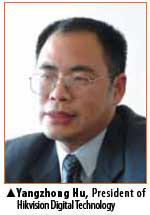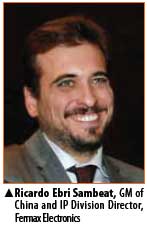Local Flavor
A slow economy and flat globe mean competition is bound to heat up in 2012. ASIS reflects this globalization, adding “International” to its name 10 years ago and naming its first non-American president for 2012. “Headquarters benefits from the range of perspectives and security challenges, as well as the important local flavors, derived from its global membership,” Emde said. The IT space is poised to compete with security, particularly for IP applications. “It's about drawing the complete picture. A lot of vendors are focused on the product, how it's the latest and fastest,” Shakespeare said. “Well, so what? Why should I buy it? The application story is the real difference in the space we're in.”
Tailoring solutions to local tastes is one way to distinguish a brand. With all eyes on China, the effort to reach buyers has redoubled, even by domestic vendors. The “Safe City” initiative offered tremendous opportunities over the past six years, but public spending has slowed in China and overseas demand is contracting.
 Safe-city projects were limited in scope, providing video for the police but few other benefits, said Yangzhong Hu, President of Hikvision Digital Technology. Going forward, the push for smart cities will provide networked benefits and services to citizens, making security part of the solution but not the focus. As the numbers of projects and clients shrink, security will likely not be a separate industry but part of a complete service offering.
Safe-city projects were limited in scope, providing video for the police but few other benefits, said Yangzhong Hu, President of Hikvision Digital Technology. Going forward, the push for smart cities will provide networked benefits and services to citizens, making security part of the solution but not the focus. As the numbers of projects and clients shrink, security will likely not be a separate industry but part of a complete service offering.
China's growth may be slowing, but it remains a target for global security players. Bosch operations in China now report directly to the board for quicker response and better management. “We have our own product development team and plans specialized for China, and the R&D results can be shared with the rest of the world as well,” said Koen Rommel, VP of Sales for China, Bosch Security Systems. “In fact, China is a continent; we have opened up 25 regional offices throughout the country so far, to have better eyes and ears on the market and to actively support customers and projects.”
APAC also figures prominently for Genetec in 2012. “Every quarter, I fly to every region to check on things,” said Guy Chénard, VP of Worldwide Sales and Business Development. “These trips are critical, as 80 percent of our business comes from working closely with system integrators and consultants.”
Entering a new market requires an understanding of the local mindset. “We cannot simply replicate and transfer what we have done in the mature markets to here directly,” said Daniel Chau, Marketing Director for APAC, Honeywell Security. “China today is the largest country for luxury goods worldwide; sometimes, customers here want even higherend, more advanced features.”
Other vendors have set up shop overseas. “In Asia, we have centers of excellence in Shanghai and Bangalore, as what has worked in the U.S. or Europe might not work in the region,” said John Becker, Senior Sales Director for APAC, Tyco Security Products. “There is no silver bullet; focus, communication and partner recruitment have to be ongoing.”
The local infrastructure also needs to be considered. For China,broadband penetration figures are higher than US figures, but the rate of penetration is not as widespread, Chau said. DSL and 3-G networks are only beginning to be rolled out in Tiers 3 and 4 cities.
Having IP solutions is a boon, as they expand a vendor's reach into more projects; each project or country has its unique requirements. “For example, we need to make sure the new products are not affected by static electricity caused by carpets, which may not be a concern in China but are a real issue in many parts of the world,” said Ricardo Ebri Sambeat, GM of China and IP Division Director, Fermax Electronics. “In the Netherlands, we need to make sure everyone can input their name regardless of length. In France, a special button for mailmen is required by law.”